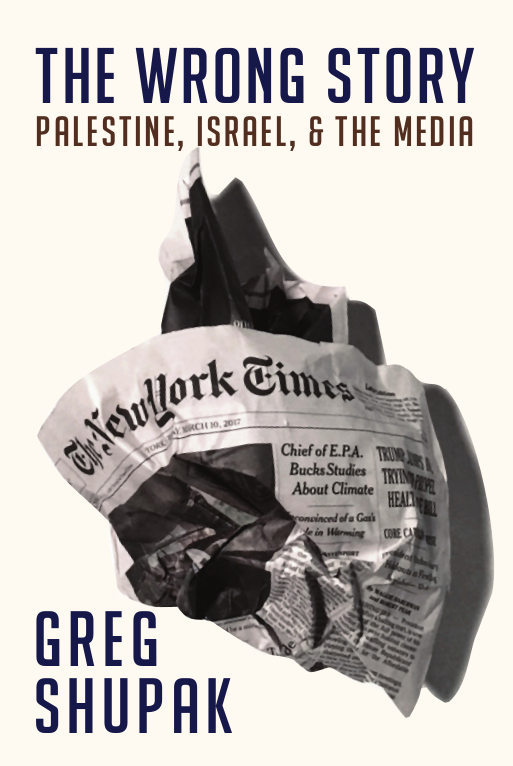

|
|

The Wrong Story: Palestine, Israel and the Media
Shupak, Greg
Date Written: 2018-06-11Publisher: OR Books Year Published: 2018 Pages: 158pp Price: 7.73 Resource Type: Book Cx Number: CX22996 The Wrong Story lays bare the flaws in the way large media organizations present the Palestine–Israel issue. It points out major fallacies in the fundamental conceptions that underpin their coverage, namely that Palestinians and Israelis are both victims to comparable extents and are equally responsible for the failure to find a solution; that the problem is "extremists," often religiously-motivated ones, who need to be sidelined in favour of “moderates”; and that Israel’s uses of force are typically justifiable acts of self-defense. Weaving together the existing literature with new insights, Shupak offers an up-to-date and tightly focused guide that exposes the distorted way these issues are presented and why each is misguided. Abstract: - Excerpt: 15 Million Jews and a Hundred Times More Muslims It is more often the Palestinians who are reduced to religious zealots than the Israelis. In such cases, the “extremists and moderates” narrative favors Israel by presenting it as contending with theocratic fundamentalists who cannot be reasoned with let alone be expected to abide by a resolution under which Arabs and Jews might live together peacefully and as equals. The religious extremists narrative, I will show, errs by abstracting religious devotion from the social factors with which it interplays. Such perspectives point audiences toward overly simplistic perspectives while obscuring a wealth of important aspects of Palestine-Israel that need to be comprehended in order to understand the issue. In November 2014, two Palestinians killed five Israelis, including four rabbis, in a Jerusalem synagogue. Following the attack, Anshel Pfeffer, a correspondent for Ha’aretz, wrote in The Guardian that "This is what a religious war looks like, and we should stop kidding ourselves that this is not what has been happening in the Middle East." Pfeffer describes the notion that Palestine-Israel is a fight over territory as a "charade" and "the sheikhs and rabbis" as "the real movers in the wars of hate." He then writes that "Accepting that the Palestine-Israel conflict is also a bitter religious war runs counter to the international community's preferred solutions . . . which is a central reason that none of these solutions have worked." He also claims that whereas "most Israelis abhor” acts such as the burning of Palestinian mosques "even a cursory glance at the Palestinian media reveals a glorification of attacks against Jews." Sam Harris, the neuroscientist and bestselling atheist pundit, was on a podcast during Protective Edge that was then turned into a widely circulated blog post entitled "Why Don't I Criticize Israel?" Harris frames his discussion of Palestine-Israel around religion from the outset when he says that he has criticized "both Israel and Judaism" but has "kept some sense of proportion. There are something like 15 million Jews on earth at this moment; there are a hundred times as many Muslims." He then explains why he thinks Judaism is less bad than Islam or Christianity. In his view, the question of Palestine is not only a religious conflict between Israelis and Palestinians but a conflict between Muslims and Jewish people in general. The facts that there are approximately half a million Palestinian Christians and that most Jewish people do not live in Israel go unmentioned. Harris further claims that "incompatible religious attachments to this land have made it impossible for Muslims and Jews to negotiate like rational human beings, and they have made it impossible for them to live in peace." Subject Headings |